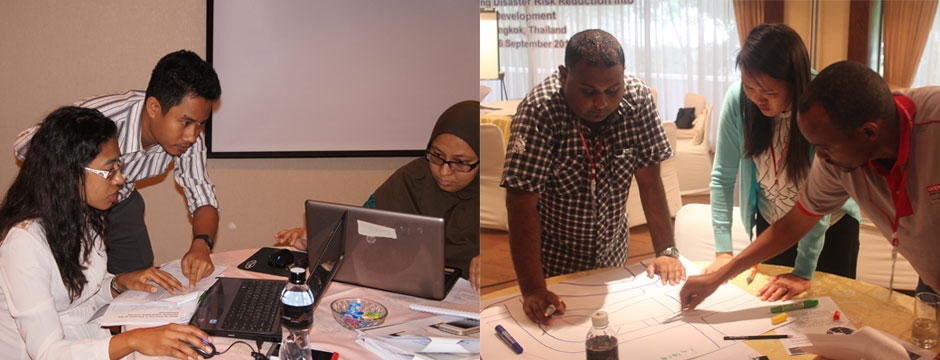Regional training services
ADPC Academy delivers regional flagship training courses with support from technical departments. The curricula is constantly updated to meet the current needs in the field of disaster risk reduction.
Tailor-made training services
With ADPC’s mission for safer communities and sustainable development, it continues to build the capacities of national training institutions, academia and partner agencies to deliver quality training services at national level. ADPC provides national training agencies with technical assistance to standardize and deliver localized training courses.
Program-based training services
ADPC offers program-related training delivered by the technical departments with support from Academy.
Training assignments for regional agencies
On the request of regional agencies, ADPC delivers customized training assignments. Previously, ADPC has conducted joint training courses with eg. Association of Southeast Asian Nations (ASEAN), Channel Research, South Asian Association for Regional Cooperation (SAARC), and United States Forest Service (USFS).
Contribution to academic and post-graduate courses
ADPC supports academia and countries in the Asia-Pacific region in delivering their academic programs. ADPC has collaborated with eg. Asian Institute of Technology and University of Tulane.
ADPC training programs
ADPC’s ongoing training programs include generic, hazard-specific and tailor-made courses.
Generic courses
· Community-based disaster risk reduction (CBDRR)
· Crisis management course (CMC)
· Disaster and development (D&D)
· Disaster management (DMC)
· Mainstreaming disaster risk reduction in local governance (MDRRG)
· Mainstreaming disaster risk reduction into development planning (MDRD)
· Monitoring and evaluation for disaster risk reduction (MEDRR)
· Road accident rescue course (RAR)
· Urban disaster risk management (UDRM)
Hazard-specific courses
· Climate risk management and climate change adaptation (CRM)
· Earthquake vulnerability risk reduction (EVRC)
· Flood disaster risk management (FDRM)
· Improvement in cyclone warning response and mitigation (ICWRM)
· Seismic hazard risk assessment
· Seismic and cyclone hazard mitigation (SCHM)
· Urban Flood Management (UFM)
Tailor-made courses
· Community action for disaster response (CADRE)
· Disaster risk communication (DRC)
· Emergency exercise management
· Emergency response management
· End-to-end multi-hazard early warning systems (EWS)
· Damage assessment and need analysis (DANA)
· GIS for disaster risk management (GIS4DRM)
· Incident command system (ICS) / Incident management system (IMS)
· Skills for effective trainer (SET)
· Training for instructor (TFI)
· Training of trainers (TOT)
· Health-related issues:
o Hospital emergencies preparedness and response (HEPR)
o Hospital preparedness for emergencies (HOPE)
o Medical first responders
o Mental health and psychosocial support (MHPSS)
o Nutrition in disaster course (NDC)
o Nutrition in emergencies (NIE)
o Nutrition in children and mother in disaster (NCMD)
o Public health in complex emergencies (PHCE)
o Public health and emergency management in Asia and the Pacific (PHEMAP)
